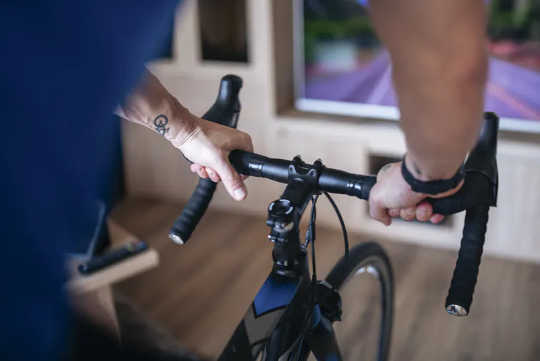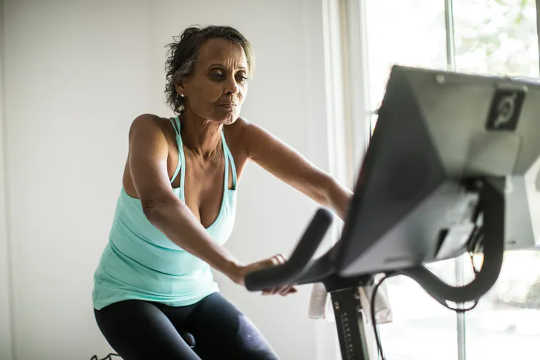
Riding together from afar can help you build the exercise habit. ArtistGNDphotography/E+ via Getty Images
Sales of exercise gear and technology-based fitness tools have exploded in the U.S. as people try to maintain their workout regimens without going to the gym.
Purchases range from simple dumbbells and outdoor bicycles to internet-connected devices such as the Peloton stationary bike or the Tonal digital weight machine. There are exercise video games like Nintendo’s Wii Fit and PS-2’s Eye Toy: Kinetic; wearable technology like Fitbits or Apple Watches; and mobile apps like Strava. People are even using platforms like Zoom or Skype to connect with a personal trainer.
These connected fitness tools bring together your exercise workouts and your digital life. As researchers in the field of kinesiology, we’ve studied the effects of connected fitness on motivation and fitness outcomes. If you’re looking for ways to beef up your fitness during pandemic-related downtime or to replace a pre-COVID-19 exercise routine, one of these tech-enabled items may work for you.

Games like the Wii Fit make users move their bodies to play. Neilson Barnard/Getty Images for Nintendo
Get The Latest By Email
Tapping into the tech
Connected fitness is not new. The first such technology was developed in the 1980s: stationary bikes connected to game consoles that required pedaling and steering on a handlebar-mounted gamepad. Exercise video games (exergames) were first created around the same time, really taking off in the late 1990s with games like Dance Dance Revolution and Nintendo Wii Fit that require limb or trunk movement as the primary interface with the technology.
New and creative technologies, however, continue to make exercise more convenient, trackable and customized. Some exergames have become more gamified, including rewards, challenge levels, leader boards and immersive story lines to create elements of competition and enhance engagement.
Even before the pandemic, connected fitness devices and exergames were appealing because they eliminate some of common barriers to exercise or physical therapy. Users don’t need to worry about the scheduling problems, costs of joining exercise programs or social physique anxiety that can be associated with working out in public. These tools also shift the focus away from what can be unpleasant parts of exercising – like exertion, fatigue and boredom – to novel and engaging aspects of the activity.
One hitch, though, is that so far there are no independent “Consumer Reports”-type evaluations of how much these technologies affect performance outcomes or influence behavior.

Inspiring gameified content doesn’t help your fitness if you don’t make it a habit. MoMo Productions/DigitalVision via Getty Images
Connected in more than one way
Purchasing fitness equipment and technology-based devices is a great first step toward adding more physical activity to your life. But just like with a gym membership that’s paid for but never used, a high-tech piece of gear can gather dust.
Luckily, exercise psychology researchers have figured out frameworks that are more likely to help folks keep up the intensity of their exercise regimens and turn them into habits. Setting exercise goals, having individual choices in the type of workout, seeing improvements in your performance and exercising with others all make you more likely to stick with it. Working out in a group, in particular, enhances the experience. The added social elements – including cooperation, coordination, obligation to the group, social comparison and even competition – all contribute.
Of course, finding the right exercise partner or group in these pandemic times can be difficult. Gyms are closed and social distancing guidelines are in effect. Can a virtual buddy do the job?
Our research team, which began investigating partnered exergames long before the pandemic, was the first to examine the use of virtual as well as nonhuman, software-generated exercise partners.
Based on principles of social comparison and what it takes to be a valued teammate, we customized our partners to be somewhat faster than the exerciser to provide a challenge to keep up. We also electronically “tethered” the partner to the exerciser in such a way that if the exerciser slowed down below their target pace, the partner had to slow down too. So if you start slacking, you slow down the team. This tool builds in some obligation to your partner.
We found that motivation and performance improve when the partner is slightly better than the exerciser. This finding held whether the partner is real, but virtually presented, or unreal and software-generated, and with a stationary bike or a walking app.
Even if you don’t have a software-generated exercise buddy, you can team up with someone on FaceTime or Zoom while you are on a stationary bike, treadmill or even doing dance aerobics. That way you can challenge and encourage each other to keep up the pace. Teaming up with someone who will also hold you accountable to keep showing up is also helpful.
Even if you can’t find someone who can work out virtually with you at the same time, you can still share your workout results, compare notes and set future team challenges. A number of running apps, like Strava and RunKeeper, for instance, allow you to keep in touch with running buddies. Pricey indoor cycling classes like Peloton offer many options for how much or how little you want to compare with others, and let you share workouts with friends.
But you can apply the same motivational principles without spending money on such programs. Choose your activity, set your workout goals and search out an exercise buddy where you both challenge and encourage each other. If finding a workout pal is difficult, GetMotivedBuddies provides a low-cost membership.
Just having fun or really working up a sweat
Certainly, any movement is superior to a sedentary lifestyle in terms of health benefits. But to meet U.S. Department of Health and Human Services recommendations, adults should attain at least 150 minutes per week of physical activity that is of at least the intensity of a brisk walk.
[Get our best science, health and technology stories. Sign up for The Conversation’s science newsletter.]
Few of the companies that sell technology-based tools to increase physical activity have provided evidence of objective changes in long-term physical activity. Exergames may or may not help you meet recommended levels of physical activity.
In one systematic review of 28 studies, researchers found that when playing the game outside of structured settings, exergamers rarely hit moderate to vigorous physical activity levels. The most common exergames reviewed were DDR, Wii Fit, Playstation2 and GameBike.
An important consideration is how tools are used. For example, people can cheat to avoid exercise with a Wii controller by simply flicking the wrist instead of performing full-body movements. People still must commit to using tools for their intended purpose.
Physical activity is good for you in so many ways – including lowering the risk of developing multiple forms of cancer, diabetes and cardiovascular disease. Importantly, physical activity is also positively linked to immune system function and mental health, which are paramount concerns during a pandemic like COVID-19.
So figure out your personal preferences and what motivates you. See what resources you can access. Fortunately, there are creative options available for those wishing to be physically active, and many of them involve technology-based tools. Now is a great time to get connected to fitness.
About the Authors
Deborah Feltz, Distinguished Professor Emerita of Kinesiology, Michigan State University and Karin Pfeiffer, Professor of Kinesiology, Michigan State University
This article is republished from The Conversation under a Creative Commons license. Read the original article.
books_exercise







